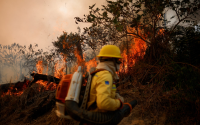21 May 2007David Shukman
 Each iceberg contains millions of tonnes of water |
We are in the far north.
There are eight of us bunched around a table - five American scientists and our team of three.
We are warm in here, a gas heater fights the vicious cold outside. This night the temperature falls to -17C (1F); -30C (-22F) if you add the effect of the wind.
There is steam rising from our plates. One of the senior scientists has just served up a meal of fried halibut. It is delicious and we praise his skill handling the camping stove.
A bottle of wine is passed round and we swap stories. It is a civilised, convivial scene and for a while I forget where I am.
Soon it is time for coffee and then I am brought back to reality.
To make the coffee, one of our hosts reaches for a dustbin and from it he scoops a load of snow which he tips into a pot. This is our water supply. This is no ordinary dinner party.
I have to pinch myself but we are actually camped on one of the largest masses of ice in the world.
Beneath my chair there is a monumental glacial block, almost a mile thick.
 Scientists at the camp use satellite signals to track how fast the ice sheet is melting |
No lights, no roads, no life, just us.
I turn down the offer of coffee and reach for the malt whisky instead.
Beside me is the man who founded this research base 15 years ago. A tall, genial professor, Konrad Steffen has the clear blue eyes, lined face and beard of a man who has spent long years in the Arctic.
His colleagues say he is so tough he never feels the cold.
Known by everyone as "Koni", his goal is simple - to make the most accurate measurements possible of what is really happening to the ice.
Koni is not a man content to analyse other people's data.
He once spent six months of the Arctic winter recording the ice. On another mission he repeatedly stayed awake for 24-hour periods to measure how much solar radiation was being reflected by the snow.
Dinner over, we stumble through the snowdrifts to our tent and yearn for a little global warming.
Vanishing horizon
The next day the weather is still brutal.
Our camera jams, so does the back-up and even a third grinds to a halt. An expedition by snowmobile leaves us shaking with cold.
The horizon vanishes in an unrelenting blast of white. Our plan was to stay just one night but the helicopter meant to pick us up cannot make it. We are stuck.
Koni grins. "It's Greenland," he says.
The following days and nights roll into one. We pass the time by working when we can, or burrowing into our sleeping bags or huddling by the gas fire.
One of our companions is another veteran ice scientist, Jay Zwally.
It was Jay who had cooked so well the first night and now, thinking our morale needs lifting, he adds to our sense of the surreal by feeding us lobster.
'Stuntman'
It is even better than the halibut. Our spirits lift and we coax more stories out of Koni.
 Konrad Steffen has spent long years in the Arctic |
Or when the ice he was camped on broke away and started drifting for the ocean. Koni's only escape had been to rev up his snowmobile and, like a stuntman, jump the gap.
Endeavours like this were what led these scientists to a major discovery.
The ice sheet was always assumed to be so cold that to shift it you would need warmer conditions for hundreds or thousands of years.
But research here has revealed a startling reality: that the ice sheet, which is always creeping downhill towards the coast, actually doubles in speed during the few weeks of summer.
The implications are huge.
Getting to the truth
The warmer the temperatures, the more rapidly enormous quantities of ice will reach the sea and so affect its level - worldwide.
Eventually we spot a hint of horizon. We pack up and wait for the helicopter.
We hear its drum beat approach but then retreat. The pilot still cannot land. Our faces drop.
"Don't worry," announces Jay, "I'm doing sushi tonight."
Well, we never get to try it. Much later the helicopter does manage to lift us away.
Jay and Koni stand waving. Our stay lasted four days and I am desperate for a shower.
But, as the camp vanishes into the white below us, I realise I have learned something: all too often politicians and environmentalists make assumptions about climate change.
And out in the cold there is a small band of hardy scientists getting at the truth of it.
From Our Own Correspondent was broadcast on Saturday, 21 May, 2005, at 1130 BST on BBC Radio 4. Please check the programme schedules for World Service transmission times.
http://news.bbc.co.uk/2/hi/programmes/from_our_own_correspondent/4566123.stm






